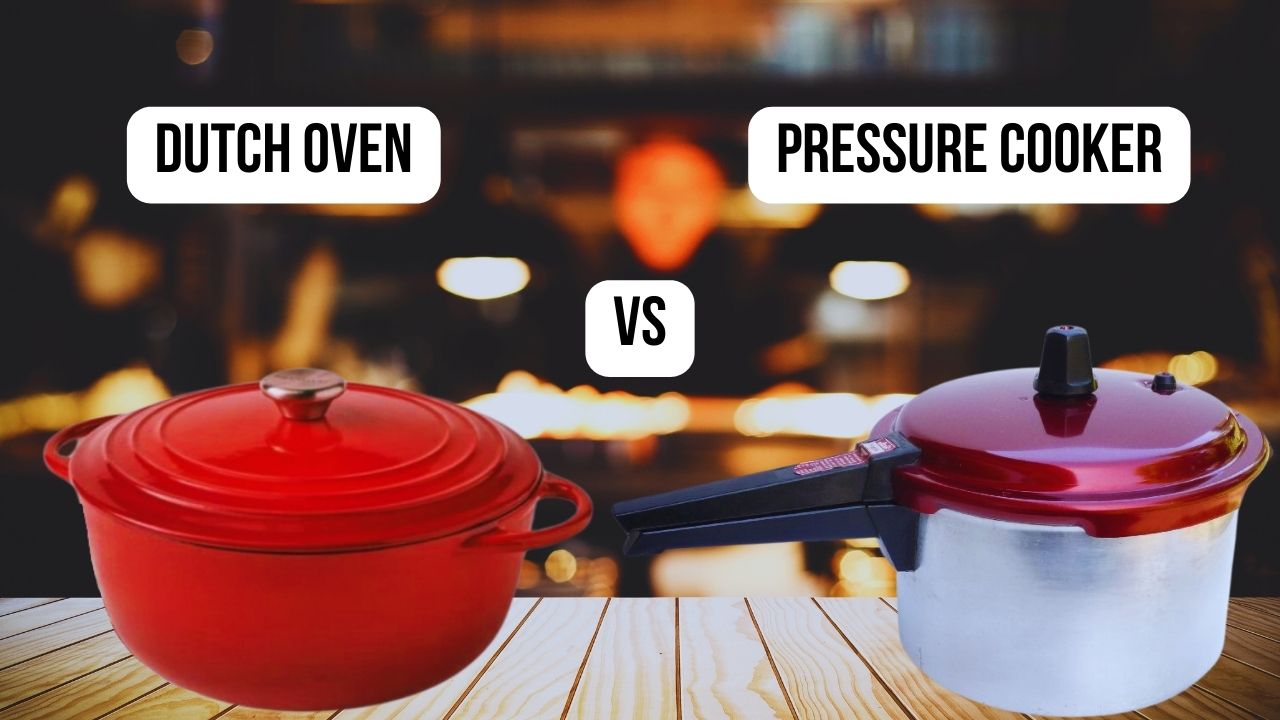Are you contemplating whether to invest in a Dutch oven or a pressure cooker? These two kitchen powerhouses may appear similar at first glance, but they cater to distinct cooking needs.
As a restaurant chef for over a decade, I will differentiate between Dutch ovens and pressure cookers in this post. We will explore their features, functions, and the pros and cons that set them apart.
What is a Pressure Cooker?
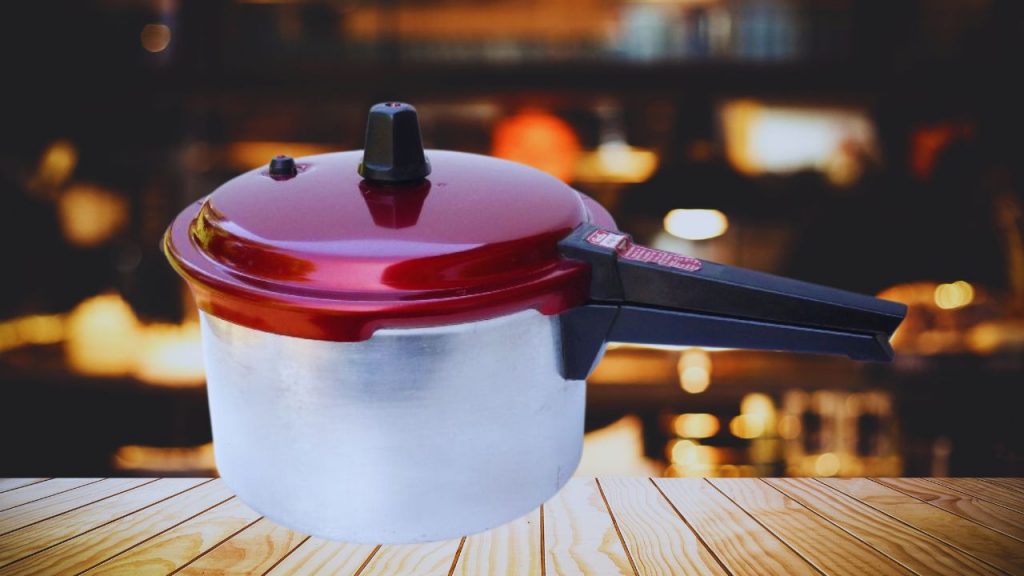
A pressure cooker is a cooking vessel with a sealed environment that utilizes steam pressure to cook food rapidly. It’s a time-saving marvel in the kitchen, which revolutionizes how we prepare meals.
Pressure cookers come in various types, each catering to different needs and preferences. Some types of pressure cookers are stovetop, electric, digital, commercial or industrial, and multipurpose pressure cookers.
What Does a Pressure Cooker Do?
A pressure cooker has the capacity to reduce cooking times dramatically. It elevates temperatures by trapping steam within the sealed pot, which hastens the cooking process. You can cook dishes from succulent stews to perfectly tender beans.
What Are the Pros and Cons of a Pressure Cooker?
Pros
- Time Efficiency: Rapid cooking times make it a go-to for busy individuals.
- Retained Nutrients: The sealed environment helps preserve the nutritional value of ingredients.
- Versatility: Ideal for a variety of dishes, from soups to desserts.
Cons
- Learning Curve: Mastering pressure cooking techniques may take some trial and error.
- Limited Browning: Not suitable for recipes that require extensive browning or crisping.
What Is a Dutch Oven?
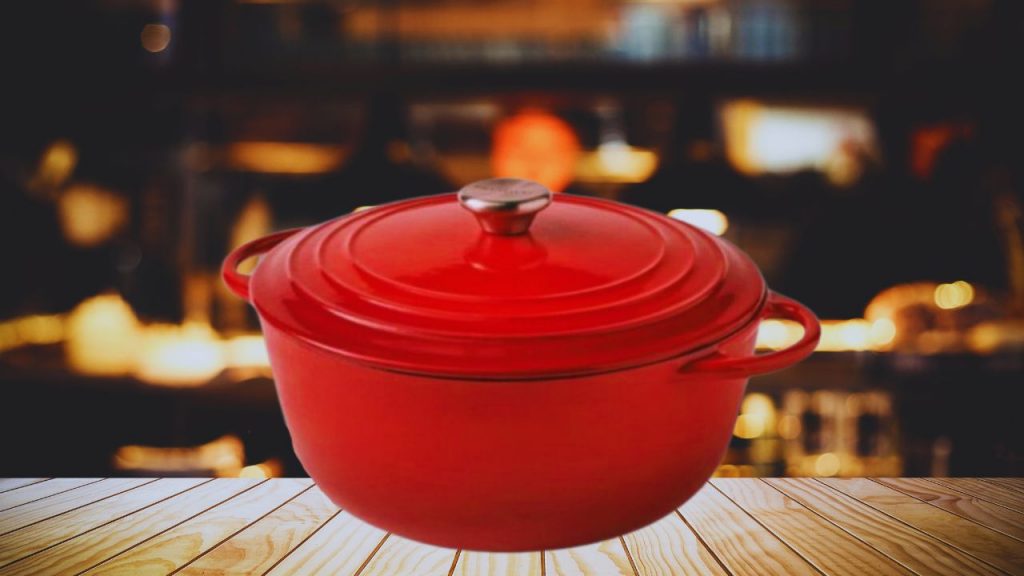
On the other hand, a Dutch oven is a sturdy, heavy pot, usually made of cast iron, with thick walls and a tight-fitting lid. Its design allows for slow, even cooking and is a staple in traditional and contemporary kitchens alike.
What Does a Dutch Oven Do?
The Dutch oven excels in slow-cooking methods, making it perfect for simmering, braising, roasting, and baking. It can distribute heat evenly, which makes it a reliable choice for creating rich, complex dish flavors.
You can create many dishes using the Dutch oven. You can roast a turkey while the Dutch oven‘s snug lid seals in its juices. You can also bake artisanal bread, with its crust perfectly crisped by the cast-iron embrace of this versatile pot. Or you can make a flavorful stew with tender and moist meat that everyone will surely enjoy.
What Are the Pros and Cons of a Dutch Oven?
Pros
- Versatility: The Dutch oven seamlessly transitions between cooking methods from stovetop to oven.
- Even Heat Distribution: Ensures consistent results for slow-cooked masterpieces.
- Durability: Built to last, a Dutch oven is a long-term investment for your kitchen.
Cons
- Weight: The substantial weight may be cumbersome for some users.
- Price: Quality comes at a cost; Dutch ovens can be relatively expensive.
Similarities Between Dutch Ovens and Pressure Cookers
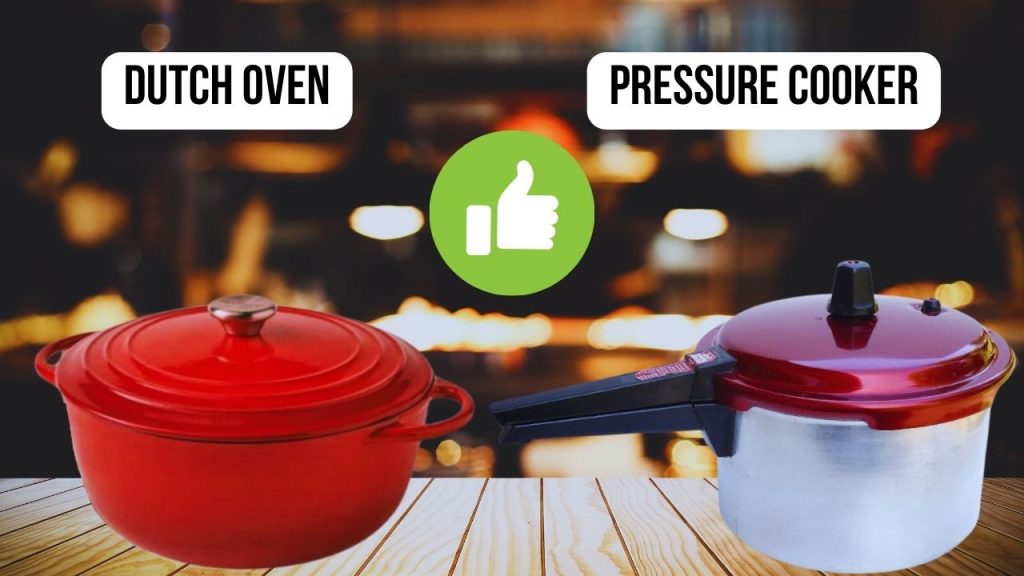
Dutch ovens and pressure cookers share some common ground.
Material
Both Dutch ovens and pressure cookers often boast durable construction, with materials like cast iron or stainless steel ensuring longevity in the kitchen. The robust build of these cookware options contributes to their ability to withstand high temperatures and frequent use.
Versatility in Cooking Methods
Despite their distinct cooking styles, both can adapt to various cooking methods.
Dutch ovens seamlessly transition from stovetop to oven, excelling in slow cooking, roasting, and baking. Similarly, electric pressure cookers often function as multicookers, offering diverse cooking options beyond pressure cooking.
Heat Retention and Distribution
One fundamental similarity between a Dutch oven and a pressure cooker is their exceptional heat retention and distribution capabilities.
With their thick walls and tight-fitting lids, Dutch ovens excel at maintaining a consistent temperature for slow, even cooking. On the other hand, pressure cookers leverage steam and pressure to cook food while preserving flavors and nutrients rapidly.
Time Efficiency
While their primary methods differ, both cookware options are committed to time efficiency.
Pressure cookers accelerate cooking times dramatically, making them ideal for those seeking quick and convenient meals. Although associated with slower cooking methods, Dutch ovens deliver flavorful results without constant supervision.
Differences Between Dutch Ovens and Pressure Cookers
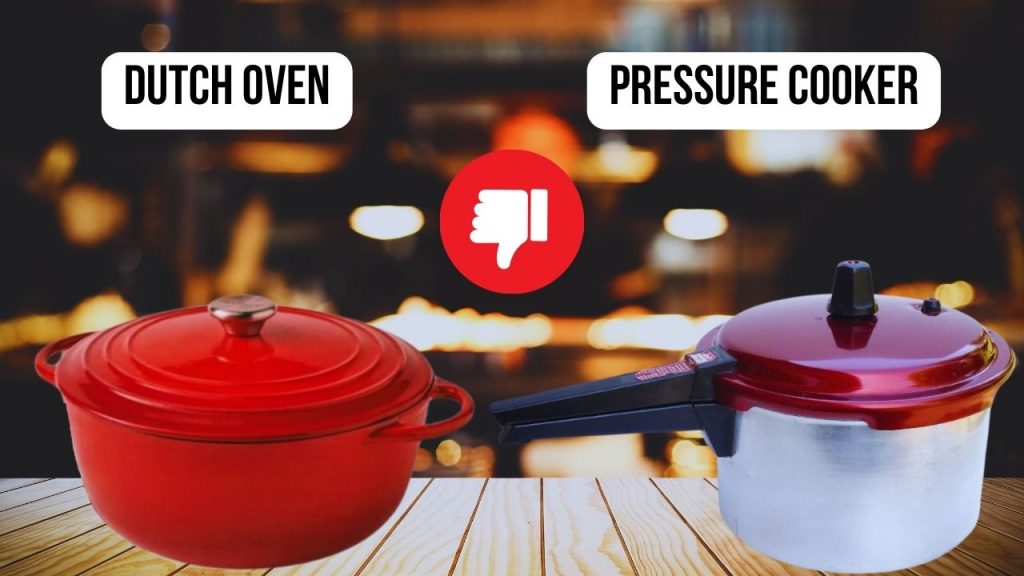
While Dutch ovens and pressure cookers have certain similarities, their core design and cooking procedures are quite different.
Cooking Speed and Method
Perhaps the most conspicuous distinction lies in their approach to cooking speed. Pressure cookers, true to their name, excel in rapid cooking through the generation of steam and increased pressure. In contrast, Dutch ovens thrive in the slow-cooking. This method flavors to meld over extended periods through low, consistent heat.
Cooking Styles
Dutch ovens are masters of slow-cooking techniques such as braising, roasting, and simmering. Their thick walls and tightly sealed lids create an ideal environment for developing rich, complex flavors over time.
Pressure cookers are perfect for those who prioritize efficiency with their ability to pressurize and expedite cooking.
Browning and Crisping
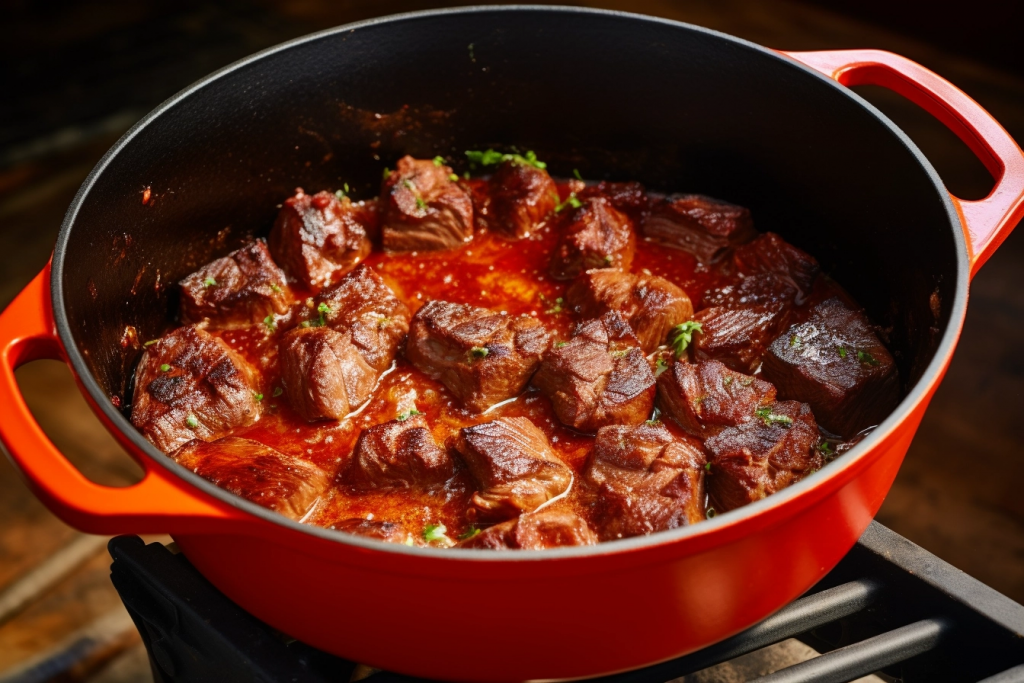
Dutch ovens typically excel in browning and crisping. The even distribution of heat and the option to use them on the stovetop makes them ideal for achieving a golden crust on meats or a perfect sear.
While exceptional for tenderizing meats, pressure cookers are not as effective for browning due to their sealed environment. Achieving a crispy texture requires additional cooking steps outside the pressure cooker.
Weight and Portability
Dutch ovens, particularly cast iron ones, tend to be heavy. While this weight contributes to their heat retention properties, it can be a factor to consider, especially for those who value portability.
Pressure cookers, particularly electric models, are generally more lightweight and portable. They are suitable for limited-space kitchens or individuals who prioritize ease of handling.
Conclusion
Dutch ovens and pressure cookers each offer a unique set of advantages that cater to specific culinary needs and preferences.
As we explored their features, functions, and the pros and cons that set them apart, it became evident that both Dutch ovens and pressure cookers have their place in the kitchen. They complement each other, each contributing unique strengths to the culinary ensemble.
Moreover, discovering common ground between these culinary powerhouses highlights their versatility, durability, and shared commitment to making the cooking process efficient and enjoyable. Yet, the differences remain, providing chefs with choices that align with their cooking style, preferences, and the flavors they seek to create.
Whether you opt for the pressure cooker’s swift efficiency or the Dutch oven’s slow-cooked perfection, both promise to elevate your culinary creations.
Don’t miss out on the compilation of the top-rated Dutch ovens.

